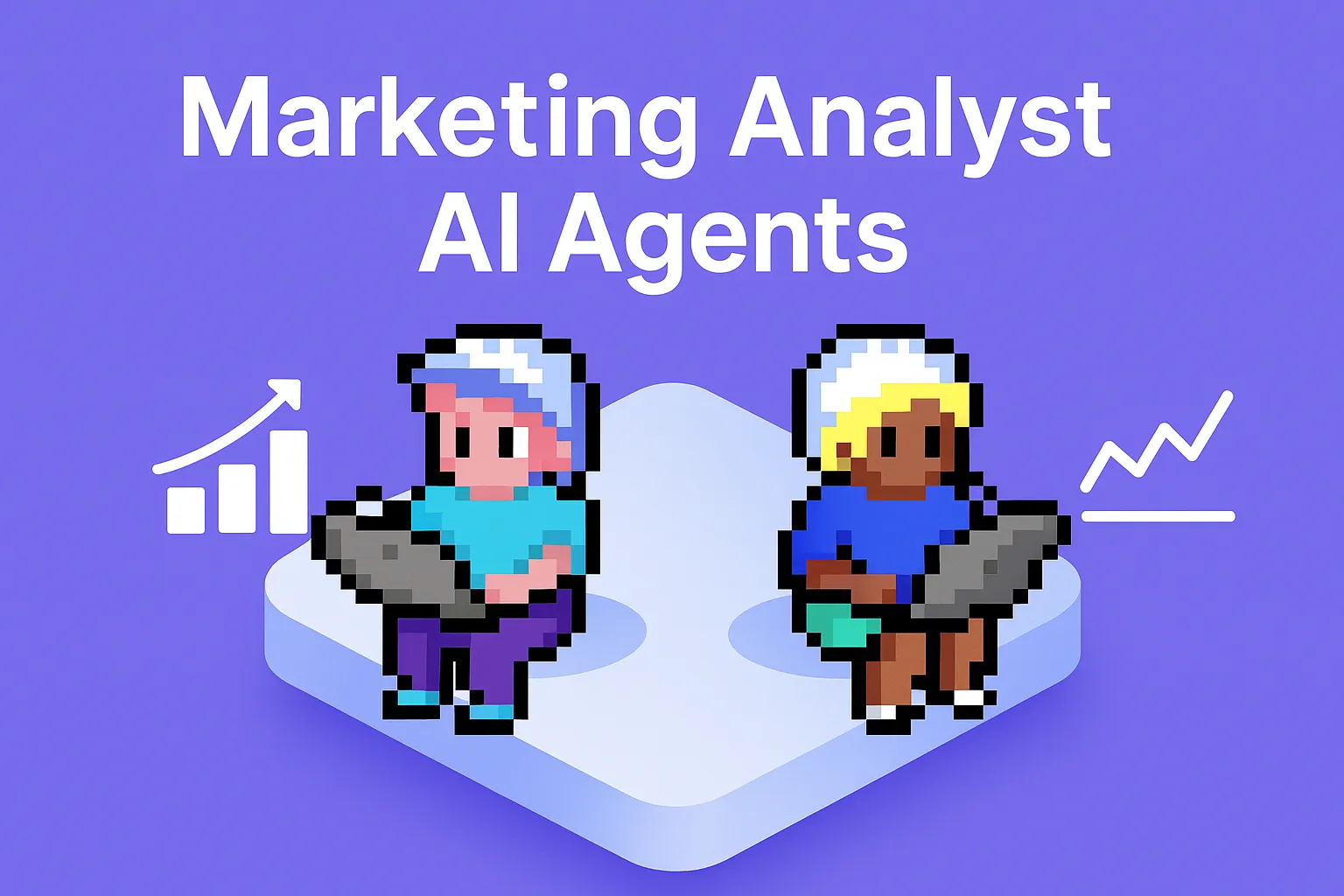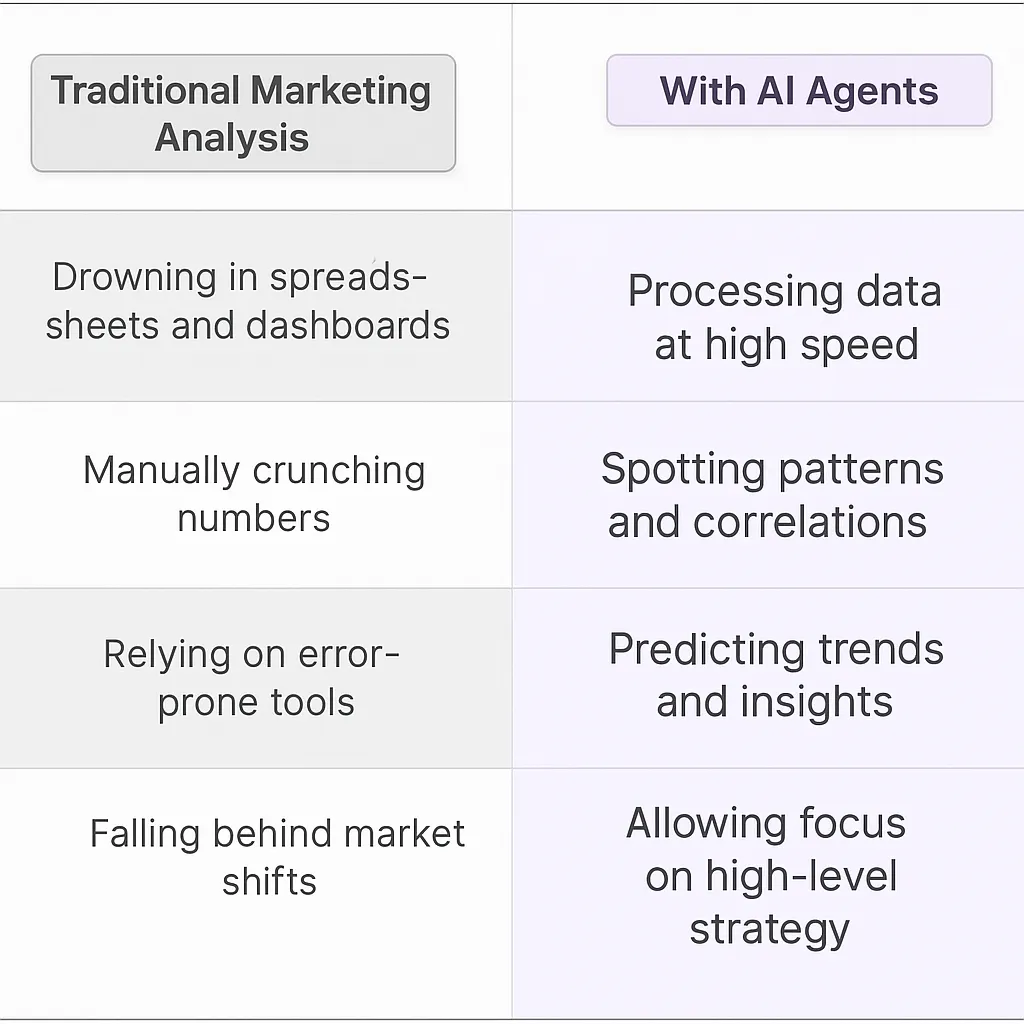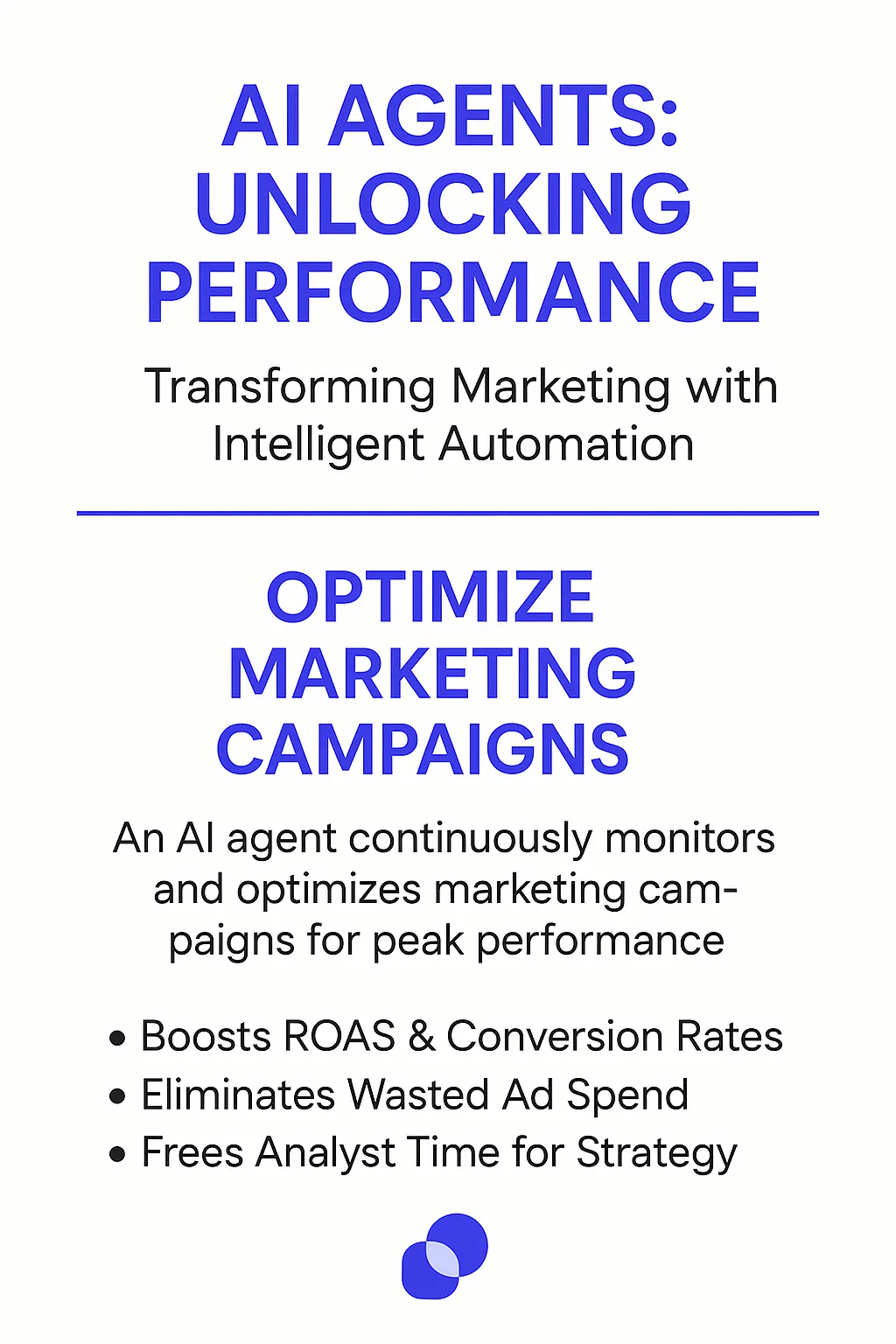A Marketing Analyst is a data-driven professional who plays a crucial role in helping organizations make informed marketing decisions. Here's a concise overview of their role:
Marketing Analysts collect, analyze, and interpret data related to market trends, consumer behavior, and marketing campaign performance. They use various analytical tools and techniques to transform raw data into actionable insights. These professionals work closely with marketing teams to develop strategies, optimize campaigns, and measure their effectiveness.
Key responsibilities often include:
Their work helps companies target the right audiences, allocate marketing budgets effectively, and improve overall marketing performance.

Before AI agents entered the scene, marketing analysts were drowning in spreadsheets, wrestling with clunky dashboards, and spending countless hours manually crunching numbers. They'd rely on a mishmash of tools - from basic Excel formulas to more advanced statistical software - but the process was often slow, error-prone, and frankly, soul-crushing.
The real kicker? By the time they'd finished their analysis, the market had already moved on. It was like trying to win a Formula 1 race with a horse and buggy. Sure, you might eventually cross the finish line, but you're not exactly setting any speed records.
Enter AI agents - the digital teammates that are transforming the marketing analyst's role from data janitor to strategic mastermind. These AI-powered allies are like having a team of PhDs working around the clock, but without the ego or the need for coffee breaks.
First off, AI agents are processing data at warp speed. They're ingesting terabytes of information, spotting patterns, and serving up insights faster than you can say "customer segmentation." This means marketing analysts can spend less time number-crunching and more time doing what humans do best - applying creativity and strategic thinking to solve complex problems.
But speed is just the appetizer. The main course is the depth and breadth of analysis these AI agents can provide. They're not just faster; they're smarter. They can uncover hidden correlations, predict future trends, and even suggest innovative marketing strategies based on vast amounts of historical and real-time data.
Perhaps the most game-changing benefit is the ability of AI agents to learn and adapt. Unlike traditional tools that become obsolete, these digital teammates are constantly evolving, getting smarter with each interaction. They're like interns that never graduate - they just keep getting better at their job.
For marketing analysts, this means a dramatic shift in their day-to-day work. Instead of being bogged down in data preparation and basic analysis, they can focus on high-level strategy, creative problem-solving, and driving real business impact. It's like going from being a mechanic tinkering under the hood to being the driver, steering the car towards victory.
In essence, AI agents are not just tools; they're catalysts for a fundamental shift in how marketing analysis is done. They're turning what was once a reactive, backwards-looking function into a proactive, future-focused powerhouse. And for businesses willing to embrace this change, the competitive advantage could be astronomical.

Marketing analysts are constantly juggling data-driven tasks, market research, and strategic planning. AI agents can significantly enhance their capabilities, acting as digital teammates that augment human intelligence rather than replace it. These AI-powered tools can handle complex data analysis, automate repetitive tasks, and provide real-time insights that would typically take hours or days to compile manually.
One of the most impactful processes AI agents can assist with is customer segmentation. By leveraging machine learning algorithms, these digital teammates can analyze vast amounts of customer data, identifying patterns and clusters that might escape human observation. This allows marketing analysts to create more nuanced and effective targeting strategies, ultimately driving higher ROI on marketing campaigns.
Another critical process is trend forecasting. AI agents can continuously monitor social media, news outlets, and industry publications, synthesizing this information to predict emerging trends. This gives marketing analysts a competitive edge, allowing them to stay ahead of the curve and adjust strategies proactively rather than reactively.
When it comes to specific tasks, AI agents can be game-changers for marketing analysts. Take A/B testing, for instance. These digital teammates can design and execute sophisticated multivariate tests, analyzing results in real-time and providing actionable insights. This level of testing and optimization would be incredibly time-consuming for human analysts alone.
Content optimization is another area where AI agents excel. They can analyze top-performing content across various platforms, identify key elements that drive engagement, and provide recommendations for improving existing content or creating new pieces. This data-driven approach to content creation can significantly boost a brand's organic reach and engagement.
AI agents can also tackle the often tedious task of competitor analysis. By continuously monitoring competitor websites, social media profiles, and online mentions, these digital teammates can provide regular reports on competitor strategies, pricing changes, and market positioning. This allows marketing analysts to make more informed decisions and quickly adapt to market shifts.
Perhaps one of the most valuable tasks AI agents can perform is predictive analytics. By analyzing historical data and current market trends, these digital teammates can forecast future customer behaviors, sales trends, and campaign performance. This predictive power enables marketing analysts to allocate resources more effectively and make data-driven decisions with greater confidence.
In the realm of customer experience, AI agents can analyze customer feedback across multiple channels, identifying common pain points and areas for improvement. This task, which would typically require hours of manual review, can be completed in minutes, allowing marketing analysts to quickly implement changes that enhance customer satisfaction and loyalty.
The integration of AI agents into a marketing analyst's toolkit isn't about replacing human expertise – it's about amplifying it. These digital teammates can handle the heavy lifting of data processing and analysis, freeing up human analysts to focus on strategy, creativity, and high-level decision-making. As AI technology continues to evolve, we can expect these digital teammates to become even more sophisticated, further transforming the role of marketing analysts and driving unprecedented levels of marketing effectiveness and efficiency.

Marketing analyst AI agents are reshaping the landscape of data-driven decision-making across industries. These digital teammates bring a unique blend of speed, precision, and adaptability to the table, transforming how businesses interpret and act on market trends. Let's dive into some specific use cases that illustrate how these AI agents are becoming indispensable in various sectors, enhancing workflows and uncovering insights that might otherwise remain hidden.
From e-commerce giants fine-tuning their recommendation engines to healthcare providers optimizing patient outreach, marketing analyst AI agents are proving their worth in diverse scenarios. They're not just crunching numbers; they're providing actionable intelligence that drives strategy and boosts ROI. As we explore these use cases, you'll see how these digital teammates are becoming the secret weapon for companies looking to stay ahead in the data game.
The retail industry is ripe for disruption, and marketing analyst AI agents are leading the charge. These digital teammates are transforming how brands understand and engage with consumers, creating a seismic shift in the retail landscape.
Take a major clothing retailer like Zara. They could deploy marketing analyst AI agents to sift through vast amounts of data from social media, online browsing patterns, and in-store purchases. These AI agents don't just crunch numbers; they uncover hidden patterns and predict emerging trends with uncanny accuracy.
For instance, the AI might notice a surge in searches for "neon accessories" among 18-24 year-olds in urban areas. It could then correlate this with an uptick in music festival ticket sales and recent celebrity Instagram posts. This isn't just data – it's a goldmine of actionable insights.
Armed with this information, Zara could swiftly adjust their product line, creating a limited edition of neon accessories before the trend hits mainstream. They could also tailor their marketing campaigns, perhaps partnering with music festivals or influencers to maximize impact.
But it doesn't stop there. These AI agents could continuously monitor the performance of this new product line, analyzing sales data, customer feedback, and social media sentiment in real-time. They could recommend price adjustments, identify the most effective marketing channels, and even suggest design tweaks for the next iteration.
This level of agility and precision in marketing strategy was unthinkable just a few years ago. It's not just about being reactive; it's about being predictive and proactive. Marketing analyst AI agents are essentially giving retailers a crystal ball, allowing them to stay ahead of consumer desires and market shifts through advanced predictive analytics.
The result? A retail experience that feels almost magically attuned to consumer needs, driving sales, customer loyalty, and brand relevance in an increasingly competitive market. This is the future of retail, and it's already unfolding before our eyes.
The financial services industry is undergoing a radical transformation, and marketing analyst AI agents are at the forefront of this change. These digital teammates are reshaping how investment firms understand market trends, predict investor behavior, and tailor their offerings.
Consider a global investment bank like Goldman Sachs. They could deploy marketing analyst AI agents to analyze vast troves of data from financial markets, social media sentiment, geopolitical events, and individual investor behaviors. These AI agents don't just process information; they uncover intricate correlations and predict market movements with remarkable precision.
For example, the AI might detect a growing interest in sustainable energy investments among millennials in tech hubs. It could then link this trend to recent climate policy changes, breakthroughs in battery technology, and shifts in corporate sustainability commitments. This isn't just data – it's a roadmap to the future of investing.
With these insights, Goldman Sachs could rapidly develop new ESG-focused investment products tailored to this emerging demand. They could craft targeted marketing campaigns, perhaps collaborating with clean tech startups or environmental influencers to amplify their message.
The AI agents' role doesn't end at product launch. They continuously monitor portfolio performance, investor feedback, and market conditions in real-time. They could suggest rebalancing strategies, identify the most effective communication channels for different investor segments, and even predict which clients might be at risk of churning through sophisticated predictive analytics.
This level of personalization and foresight in investment strategy was once the stuff of science fiction. It's not just about reacting to market changes; it's about anticipating them and positioning ahead of the curve. Marketing analyst AI agents are essentially giving investment firms a financial crystal ball, allowing them to surf the waves of market sentiment before they even form.
The outcome? An investment experience that feels incredibly attuned to individual investor needs and broader market dynamics, driving portfolio performance, client satisfaction, and brand trust in an industry where every basis point counts. This is the new frontier of financial services, and it's unfolding at breakneck speed.
Implementing a Marketing Analyst AI Agent isn't just about plugging in some fancy algorithms and calling it a day. It's a complex dance of data, infrastructure, and machine learning that can make even seasoned tech veterans break out in a cold sweat.
First off, you're dealing with a data firehose. Marketing data comes in all shapes and sizes - from social media engagement metrics to conversion rates and everything in between. Your AI agent needs to be able to ingest, process, and make sense of this data tsunami without drowning. This requires robust data pipelines and storage solutions that can handle the volume and variety of incoming information.
Then there's the challenge of model selection and training. Your AI agent isn't going to magically know how to analyze marketing data out of the box. You'll need to carefully select and train machine learning models that can effectively parse through marketing jargon, understand context, and draw meaningful insights. This isn't a one-and-done process either - these models will need constant refinement and retraining as marketing trends and data patterns evolve.
Let's not forget about integration. Your Marketing Analyst AI Agent doesn't exist in a vacuum. It needs to play nice with your existing marketing stack - CRMs, analytics platforms, ad management tools, you name it. Each integration is a potential point of failure, and ensuring smooth data flow between systems can be a Herculean task.
On the operational side, implementing a Marketing Analyst AI Agent is like introducing a new team member - except this one never sleeps, doesn't take coffee breaks, and can process information at superhuman speeds. Sounds great, right? Well, not so fast.
First, there's the human factor. Your marketing team has been doing things their way for years. Suddenly, you're asking them to trust an AI to analyze data and provide insights. This can lead to resistance and skepticism. You'll need to invest time and resources into change management, training your team to work alongside their new digital teammate effectively.
Then there's the question of oversight. Yes, your AI agent can crunch numbers faster than any human, but it's not infallible. You'll need to establish robust quality control processes to verify the AI's outputs and ensure it's not leading your marketing efforts down a rabbit hole based on faulty analysis.
Privacy and compliance are another can of worms. Your Marketing Analyst AI Agent will be handling sensitive customer data. You need to ensure it's doing so in a way that complies with data protection regulations like GDPR or CCPA. This isn't just ticking boxes - one misstep here could lead to hefty fines and a PR nightmare.
Lastly, there's the challenge of continuous improvement. The marketing landscape is always shifting, and your AI agent needs to keep up. This means dedicating resources to ongoing development, tweaking algorithms, and expanding capabilities. It's not enough to just set it and forget it - your Marketing Analyst AI Agent is a living, learning entity that requires constant nurturing to stay effective.
Marketing Analyst AI Agents are not just another tech fad - they're the vanguard of a fundamental shift in how we approach marketing analytics. These digital teammates are redefining the role of marketing analysts, elevating them from data crunchers to strategic visionaries. By automating the grunt work of data processing and basic analysis, AI agents free up human marketers to focus on what they do best: creative problem-solving and strategic thinking.
But let's be real - this isn't a magic bullet. Implementing these AI agents comes with its own set of challenges, from technical hurdles to operational complexities. It requires a significant investment in infrastructure, training, and change management. However, for those willing to take the plunge, the potential rewards are enormous. We're talking about the ability to predict market trends before they happen, personalize marketing efforts at scale, and make data-driven decisions with unprecedented speed and accuracy.
As we look to the future, it's clear that Marketing Analyst AI Agents will play an increasingly crucial role in shaping marketing strategies. The most successful marketing teams will be those that learn to effectively collaborate with these digital teammates, leveraging their strengths to drive innovation and growth through advanced predictive analytics. The future of marketing is here, and it's powered by AI.